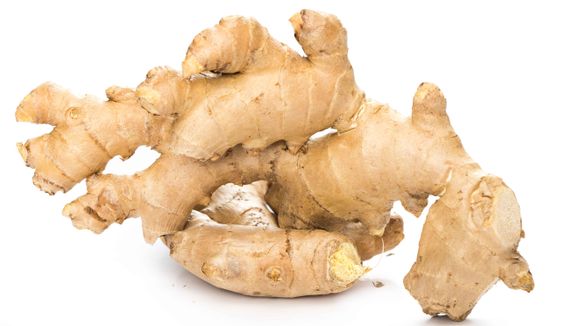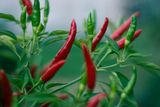What is colorectal cancer?
Colorectal cancer is a disease of the colon or rectum, which are parts of the digestive system. Unlike most cancers, colorectal cancer can often be prevented by screening and is treatable when detected in time. 1
When it comes to colorectal cancer, the most important thing to consider is time. Therefore, if you want to reduce the risk of developing colorectal cancer, pay attention to prevention as early as possible and start screening at the recommended age. Reading this article is a great start to get informed about this disease.
Most cases of colorectal cancer occur in people aged 45 years and older, but the disease increasingly affects younger people.
This disease usually begins as polyps, which are small growths of tissue in the colon. Most of them are not cancerous, but some can begin to grow uncontrollably and become cancerous.
Specifically, most cases of colorectal cancer begin in the cells of the mucus-producing glands that cover the intestines. These glandular cells can be found in polyps. Although there are other types of colon cancer, they are rare and treated differently.
Most precancerous polyps cause few, if any, symptoms. Therefore, it is extremely important to undergo routine screening for colon cancer, which must be announced by health authorities in a state strategy for screening and prevention of diseases.
Risk factors for developing colorectal cancer
Virtually any person can develop colorectal cancer, but several conditions can increase the risk, including:
- Inflammatory bowel diseases. such as Crohn's disease or ulcerative colitis.
- Obesity
- Lack of exercise
- Diet: If you eat a lot of red meat, processed meat, or meat cooked at a very high temperature, you may be at higher risk.
- Personal or family history of colorectal cancer or colorectal polyps.
- Genetic syndrome, such as familial adenomatous polyposis (FAP) or hereditary non-polyposis colorectal cancer (Lynch syndrome).
- Black/African Americans and Ashkenazi Jews are at higher risk.
Early symptoms of colorectal cancer
Many people with colorectal cancer have no symptoms in the early stages. As the disease progresses, more symptoms may appear. Symptoms may include:
- Blood in or on the stool.
- Persistent abnormal bowel movements, such as constipation or diarrhea.
- Stomach pain, aches or cramps that do not go away.
- Weight loss for no reason.
- Cramps in the lower abdomen.
- Swelling or a feeling of fullness.
- Change in appetite.
Opportunities and Challenges for the Treatment of Colorectal Cancer
Regular screening can prevent the development of colorectal cancer. Screening means the process of identifying healthy people who may be at greater risk of developing a disease by assessing their risk factors. [ref. 1]
Since a polyp takes 10–15 years to become cancerous, detecting and removing polyps at an early stage is crucial. However, only 40% of cases of colorectal cancer are detected at an early stage, and sometimes the cancer reappears after treatment.
An essential part of the healing process can be played by both standard methods - chemotherapy, immunotherapy, targeted therapy, surgery to remove tumors, radiation therapy, as well as additional methods that rely on herbal remedies. A number of scientific publications have examined the possibilities of using herbs or spices that find a place in the treatment of colorectal cancer.
Unlike many chemotherapy drugs approved for use in different countries, the use of herbs does not damage healthy cells and does not cause fatigue, headaches, muscle pain, stomach pain, diarrhea and vomiting, sore throat, blood abnormalities and others that are part of the side effects of these drugs.
Next, we will look at natural remedies with the potential for anti-cancer action, as well as their active ingredients that provide this action.
Natural Remedies for the Treatment of Colorectal Cancer
The role of spices and herbs in inhibiting colorectal cancer cell growth has been reported in many recent studies. [ref. 2 ] [ref. 3] The following herbs and spices can be used for the prevention and treatment of colorectal cancer:
Ginger (Zingiber officinale Roscoe)
The botanical name of ginger is Zingiber officinale Roscoe, which belongs to the Zingiberaceae family. It is a herbaceous perennial flowering plant native to Southeast Asia.
Ginger is an excellent source of antioxidants used to treat diseases from colds to cancer. The popularity of ginger in scientific research has skyrocketed in recent years. As of August 15, 2021 (Scopus database), there were approximately 12,092 articles focusing on ginger's beneficial effects over the period 1853 and 2021.
Ginger has at least 115 active compounds (volatile and non-volatile) in fresh and dried rhizomes, identified in various extracts. Among them are gingerols, shogaols and quercetin, which exert a variety of potent therapeutic and preventive effects, including anti-cancer effects. 5
Specifically, ginger leaf extract induces apoptosis in human colorectal cancer cells, HCT116, SW480 (human colon adenocarcinoma cells), and LoVo by activating transcription factor 3 (ATF3). ATF3 is responsible for the induction of apoptosis in CRC cells by regulating the ERK1/2 pathway, where ginger leaves (50, 100 and 200μg/ml for 24 and 48h) interact with the cAMP-responding element-binding element (CREB) site and activate ATF3. 6
Another study reported that ginger extract inhibited the growth of CRC (HCT-116) cells by lowering K-ras and MMP-2 marker gene expressions. K-ras is crucial in colorectal metastases through VGEF regulation, protease expression, apoptosis, adhesion and motility.
Turmeric (Curcuma longa L.)
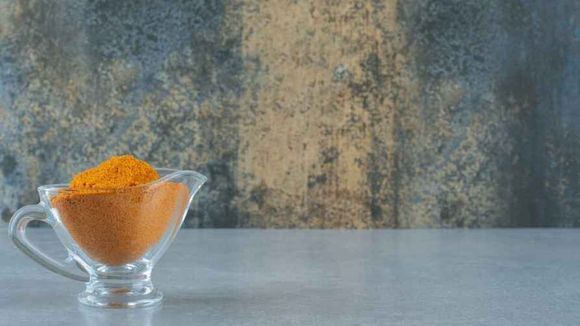
Turmeric (Curcuma longa L.) also comes from the Zingiberaceae family. In addition to improving the taste, turmeric is one of the spices used to preserve food.
Turmeric is rich in polyphenols and is known as the "miraculous medicine of life". The leading compound, curcumin, is responsible for a wide range of pharmacological activities, including antioxidant, anticancer, antimicrobial, antidiabetic, anti-inflammatory activities.
Turmeric powder contains various bioactive components. Dry turmeric contains 69.43% carbohydrates, 6.3% protein, 5.1% oils, 3.5% minerals and other elements (15.67%). Curcumin and Calebin A are the main compounds with a magnificent biological role in the treatment of colorectal cancer patients.
Curcumin helps in the treatment of many diseases, including tendinitis, liver cirrhosis, Alzheimer's disease, heart attack, hypoglycemia, gastrointestinal problems, skin and eye infections, and cancer. [ref. 4]
Currently, the main emphasis is placed by scientists on the potential effects of curcumin on cancer. As of August 15, 2021 (Scopus database), the effect of turmeric/curcumin on cancer between 1881 and 2021 was the topic of 11,519 articles, with 53% related to cancer and 16% related specifically to colorectal cancer.
Calebin A suppresses the expression of nuclear factor-kappa B (NF-κB), which promotes anti-apoptotic B-cell lymphoma (BCL-xL), B-cell lymphoma (BCL-2), proliferation (Cyclin D1), invasion biomarkers (MMP-9), metastases (CXCR4), as well as gene biomarkers for downregulated apoptosis (Caspase-3), ultimately leading to apoptosis in human colorectal adenocarcinoma (HCT116) cells.
In one study, it was demonstrated that administration of 25 μM curcumin, a potential NF-κB inhibitor, significantly suppressed NF-κB activation by inhibiting transcription factor E2F-1 and thymidylate synthase compared to untreated cell lines. It has also been shown to exhibit anti-inflammatory and antitumor properties by inducing apoptosis and modulating various signaling pathways, such as mitogen-activated protein kinase (MAPK), extracellular signal-regulated kinase (ERK), p38, Jun N-terminal kinase (JNK) in gastric cancer and neurofibroma. [ref. 5]
Garlic (Allium sativum L.)
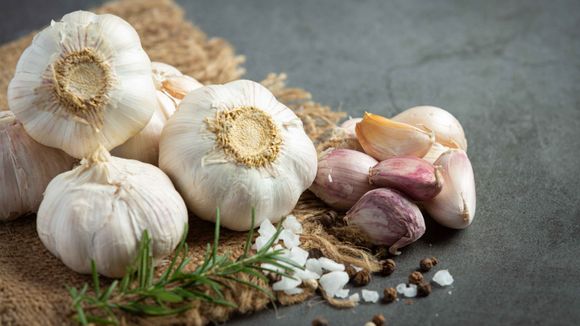
Another commonly consumed spice with anti-cancer properties is garlic (Allium sativum L.), a member of the Liliaceae family. Garlic has been shown to reduce the incidence of heart disease and cancer in epidemiological and preclinical studies, and is also claimed to be an anti-cancer food component.
Garlic has about 33 sulfur compounds, including allin, allicin, ajoen, allyl propyl disulfide, diallyl trisulfide, S-allyl cysteine, vinyldithiins, S-allyl mercapto cysteine and others, several enzymes (i.e. alinase, peroxidases, myrosinase), 17 amino acids such as arginine and others, and minerals such as selenium, germanium, tellurium and other trace elements.
As of August 15, 2021 (Scopus database), 19,339 articles related to the benefits of garlic consumption were reflected between 1854 and 2021.[1] One-third of these publications were related to its benefits in modulating cancer, while 8% were based on its benefits for colorectal cancer prevention and management.
There is convincing evidence that garlic and the sulfur components contained in it can reduce the risk of cancer and affect the biological behavior of tumors. High garlic intake is associated with reduced risks to the stomach and the development of colorectal cancer, and these properties are associated with the content of diallyl sulfide, diallyl disulfide, diallyl trisulfide, diallyl tetrasulfide, S-allyl mercaptocysteine, allicin, selenomethionine and se-methyl-L-selenocysteine.
As noted in studies, old garlic extract and its bioactive compounds are good chemopreventive agents for colorectal cancer due to their antiproliferative action on colorectal cancer cells and inhibitory activity on angiogenesis. AGE suppressed proliferation of different CRC cell lines, namely DLD1, COLO205, HT29, SW480 and SW620. There are various impacts on the invasive activities of these cell lines and the extract shows a significant decrease in invasive activity on SW480 and SW620 cells.
These and other studies suggest that old garlic extract or the bioactive compounds of garlic, mainly selenomethionine and se-methyl-L-selenocysteine, may prevent tumor formation by inhibiting angiogenesis and suppressing motility, proliferation and other mechanisms of endothelial cells. Therefore, they could be good chemopreventive agents for colorectal cancer due to their antiproliferative action on colorectal cancer cells and inhibitory activity on angiogenesis. 9
Fenugreek (Trigonella foenum-graecum L.)
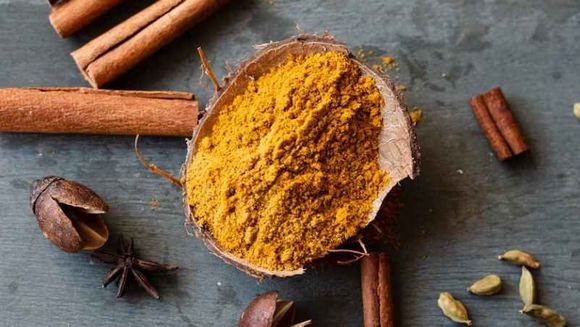
[ref. 7] Fenugreek (Trigonella foenum-graecum L.) belongs to the family Leguminosae. It has long been used as a spice to improve the sensory quality of dishes around the world, including in Bangladesh, India and Pakistan.
Among many spices that are nutritious, functional and therapeutic, fenugreek is popular with all these characteristics. Recently, it has attracted huge scientific attention to further evaluate and validate dietary supplements and health benefits, especially lifestyle related and diseases such as cancer. The Scopus database reveals that scientists published about 3,713 articles between 1931 and 2021.
Fenugreek is rich in several phytochemicals, of which diosgenin (saponin) has prominent anticarcinogenic properties. Multiple functional and molecular targets are involved in the anticancer effects of fenugreek or its bioactive compounds, such as apoptosis in tumor cell lines, especially in human colorectal cancer.
In mice treated with 1,2-dimethylhydrazine, a diet rich in fenugreek seed powder reduced the incidence of colon tumors and lipid peroxidation LPO, while increasing GPx, glutathione S-transferase (GST), SOD and catalase activity in the liver. 10 In another study, diosgenin was revealed to induce apoptosis of HT-29 human colon cancer cells.
Sesame (Sesamum indicum L.)
Sesame (Sesamum indicum) of the Pedaliaceae family is one of the earliest domesticated oilseed crops known to mankind for its diverse uses.
Sesame seeds have numerous potential bioactive compounds that are beneficial components in food and are responsible for disease prevention properties. These chemical compounds include phenols, carotenoids, phytosterols and polyunsaturated fatty acids, often used as antioxidants.
Sesame seeds contain lignans such as sesamin and sezaminol and are highly valued as a traditional healthy and nutriceutical food. The young sesame leaves contain three iridosides (lamalbid, sesamoside and changizide methyl ester) and seven polyphenols (cistanoside F, chlorogenic acid, pedalitin-6-O-laminaribyoside, pedaliin, isoactheoside, pedalitin and martinozide) and acteoside, which have potential free radical counteraction effects.
There is a wide range of bioactive molecules in sesame, including sesamin, sesamol, sesamolin, and sesaminol, which are regarded as anticancer agents. Specifically, sesamol is one of the prominent biomolecules of sesame seeds, which imparts chemopreventive properties and analgesic effects. It has a wide range of biological functions, including inhibition of lipid peroxidation and enhancement of radical removal, regulation of antioxidant enzymes, suppression of TNFα and IL-1β expression, and others. [ref. 8]
Linseed (Linum usitatissimum L.)
Flaxseed (Linum usitatissimum L.) of the Linaceae family is one of the oldest cultivated herbaceous crops in the world. It is still widely grown for its oil, fiber and nutritional value. Flaxseed oil is high in omega-3 fatty acids, linolenic acid and others.
Recently, the growth of cancer research using flaxseed has increased significantly. A systematic literature search on a Scopus database revealed that about 7,357 articles were published between 1844 and 2021, about 22% focused on cancers among these publications, and 4% specifically targeted colorectal cancer.
In vitro studies and animal models suggest that diets high in 3-PUFA may protect against malignancies, such as colon cancer, while 6-PUFA treatment may inhibit cancer cell proliferation. For example, mice fed diets fortified with α-linolenic acid, which increased plasma levels of α-linolenic acid and its metabolites eicosotetraenoic acid and docosahexaenoic acid, showed a decrease in the growth of colorectal cancer cells in transplanted patients. [ref. 9]
In other studies , α-linolenic acid inhibited cell proliferation and induced apoptosis, confirming the mechanisms of anticancer action in colorectal cancer.
